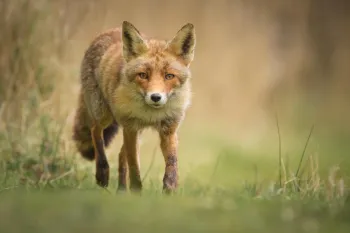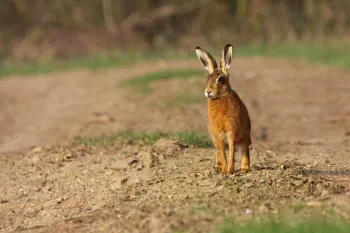LONDON—A cross-party group of 24 MPs and Peers have written to Environment Secretary Steve Reed urging the UK Government to strengthen protections for wildlife, as leading animal protection organisations Humane World for Animals UK (formerly Humane Society International UK) and the RSPCA release an academic-authored report from Anglia Ruskin University, looking at how wildlife law can better address welfare harms, and make the case for a new animal welfare-centred Wildlife Act.
James Naish, Labour MP for Rushcliffe, is lead signatory on the letter, which asks Defra to conduct an urgent review of wildlife law and assess the merits of introducing robust new legislation.
Every year, it’s estimated that millions of wild animals are persecuted, displaced and cruelly killed across Britain. The letter states that current wildlife laws are outdated and leave significant gaps in protection for some species, with the complexity of the laws and evidence requirements being a barrier to securing convictions for many wildlife crimes. As it stands, the law governing wildlife is spread across at least 33 statutes, some of which date back to the early 1800s.
Wildlife crimes are not notifiable offences but the National Wildlife Crime Unit and charities together conservatively estimate that there are around 5,000 reports of cruel and illegal practices, such as badger baiting and hare coursing, annually.1 A recent study showed that many police forces identify links between wildlife crimes and other violent and/or organized crime, including theft, drugs, money laundering and firearms offences.2
The Wildlife Law Reform report highlights acts of cruelty to wildlife that should be made illegal, such as extending the ban on use of wire snares to trap animals to England. It includes interviews with enforcers, legal specialists and RSPCA officers (including inspectors) who describe encountering various inhumane methods members of the public employ to control ‘pest’ species including foxes being shot with air rifles and grey squirrels being drowned, and inconsistent sentencing.
James Naish MP said: “My constituents and I care deeply about wildlife protection, and I know we aren’t alone: British people want wildlife to flourish and to be protected from harm. For too long, criminal groups who treat harming wild animals as a game have been using the countryside as their playground, and strengthening our weak wildlife laws would be a brilliant way to show that the government is taking animal welfare matters seriously.”
Commenting within the report, Head of the National Wildlife Crime Unit, Chief Inspector Kevin Lacks-Kelly said: “To have our officers across the country working with legislation from the 1820’s is truly unacceptable. Many of the failed cases we see are down to loopholes, lack of expertise in the court room and the exploitation of the current legislation. We have a number of examples that see badger, bird of prey and fox killers evade justice.”
In addition to the difficulties enforcement bodies face to successfully prosecute cruelty and deter criminals, when convictions are secured, the penalties are weak in comparison with other crimes towards animals—for example, the maximum custodial sentence under the Wild Mammals (Protection) Act 1996 is six months, compared to five years under the Animal Welfare Act 2006.
Claire Bass, senior director of campaigns and public affairs at Humane World for Animals UK, said: “Georgian and Victorian laws haven't kept pace with the threats and pressures British wildlife face in the 21st century and it’s not acceptable that our justice system treats wild animals as second-class citizens compared to other animals such as dogs and cats. We urge the Government to get rid of parchment paper protections and give wildlife the robust modern laws they need and deserve.”
Claire McParland, senior public affairs manager at RSPCA, said: “Police and prosecutors face a complex jigsaw puzzle of dozens of inconsistent and sometimes contradictory laws when it comes to protecting wildlife, with missing pieces allowing criminal gangs to exploit and torture wildlife. Just like the pets we share our homes with, wild animals are sentient and we believe that they should be much better protected. That's why we want to see laws updated and consolidated; better protecting all wild animals, helping the public understand their responsibilities, and ensuring perpetrators of wildlife crime are held to account."
In 2015, a Government-commissioned report by the Law Commission recommended updating and consolidating all law relating to wildlife into a single statute. A decade later, academics at Anglia Ruskin University have re-examined the problems with our wildlife laws and reached the same conclusion.
The report, Wildlife Law Reform, authored by Professor Angus Nurse and Dr Helga Hejny, has issued 10 key recommendations which include: that UK wildlife law be coordinated into a single statute; that penalties for wildlife crime should be increased to bring them in line with those for companion animal/animal abuse offences; and that wildlife harms be given a priority in planning and development.
Dr Angus Nurse, research lead and Professor of Law and Environmental Justice at ARU, said: “Research consistently shows that the complexity of wildlife law is viewed as a problem in its effective enforcement and in achieving robust protection for wildlife. The Law Commission looked at this issue around a decade ago and their view that wildlife law needs consolidation remains valid. Our research considered wildlife law in the context of wildlife harms and identified areas where the law could be improved to better prevent wildlife crime, improve enforcement and address welfare harms. We need better systems in place to protect wildlife and provide the necessary support to investigate and prosecute wildlife crimes.”
Notes
The letter from MPs and Peers to Defra can be viewed here.
The wildlife law reform research report by Professor Nurse and Dr Hejny can be viewed here. A two-page summary is available here, and extracts from interviews undertaken for the report are available here.
Many wildlife laws are devolved to Wales, Scotland and Northern Ireland.
References
1. https://wcl.org.uk/docs/2024/WCL_Wildlife_Crime_2023_Final.pdf


